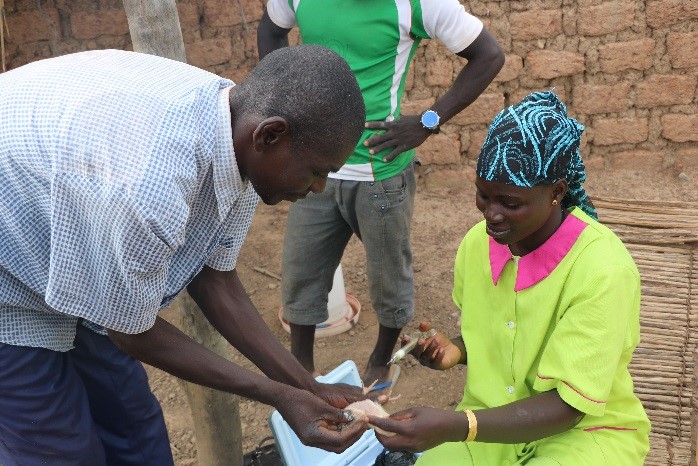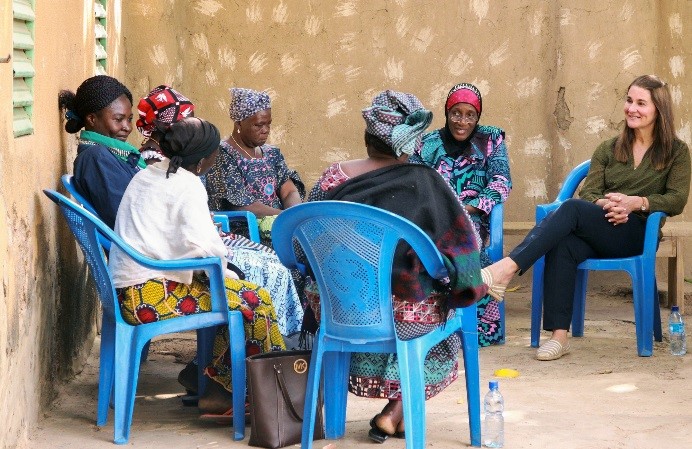|
March 2018
A Step toward Women’s Empowerment: Investing in ChickensBy Mary Devlin
On my first day of work for ASI, I got on a plane and headed to Burkina Faso. While waiting to catch our flight to Ouagadougou, my coworker briefed me on the work we’d be doing over the next couple of weeks with the SELEVER project. The project, she explained, uses poultry production as an avenue for addressing social and economic barriers that restrict women. “Wait,�? I said, “What do chickens have to do with empowering women?�? Since that day two years ago, I’ve learned that the answer to that question is that chickens are only a small part of the equation. I have come to understand that realizing lasting change for women and girls requires confronting the complex factors that limit them. I have seen how drawing men into conversations about the distribution of household chores or facilitating opportunities for women to access finance for building poultry housing can move the needle on achieving social and economic equality. SELEVER, a five-year project funded by the Bill & Melinda Gates Foundation, increases households’ access to nutritious foods through improved poultry production and higher incomes. SELEVER sees engaging women in poultry production as central to our approach—that facilitating women’s participation in poultry production and integrating them into the value chain provides a platform for opening up opportunities that increase their status and influence in their homes, communities, and economies. Women in Burkina Faso face many challenges beyond the poor living conditions experienced by many people in the country. They are less likely to be literate, access secondary education, and hold elected office. In addition, prevailing social norms define women’s ultimate role as a wife and mother. The potential economic contributions of women are often overlooked and undervalued. So how exactly does SELEVER think it can build a movement toward women’s economic and social empowerment with chickens? Improving women’s decisionmaking ability through poultry productionThe project facilitates women’s access to the tools and the knowledge that they need for poultry raising, on everything from housing and vaccinations to feed and flock size. SELEVER’s local partners use training videos and interactive training sessions to reinforce best practices in raising poultry. But making women successful in poultry production also requires confronting deeply embedded gender stereotypes. For example, while women in Burkina Faso may be allowed to take care of poultry, they generally are not seen as competent owners or producers of an income-generating activity. Rather, keeping chickens traditionally has been seen as just another aspect of woman’s domestic work and, at best, a side activity. To overcome these challenges, SELEVER’s local partners facilitate conversations with men and women around gender equity, women in agriculture, household communication, and developing household spending plans. The project also works with male and female community leaders to help them reassess the prevailing attitudes surrounding women’s participation in poultry production and encourage them to continue the conversation in their communities through discussions, theater, and other events. These activities particularly engage men to see the role they can play in supporting their wives for the success of the household. Alizeta Fofana and her husband took part in these community-led discussions and saw an opportunity to invest more in poultry. They saw that they could work together to make this an activity that benefited their family.

“I am really happy…because my husband is helping me in it,�? says Alizeta. “He helps me in my activity, he feeds and waters my poultry, and he goes to get the medicine for them.�? Increasing women’s market inclusion through poultry productionSELEVER’s facilitative approach includes identifying opportunities within the poultry value chain to integrate women. The project has equipped a cohort of female village livestock vaccinators that provide vaccination services in their respective areas, reducing the risk of diseases that can quickly wipe out an entire flock. The project also links these vaccinators with government extension agents and other value chain actors to improve and expand the services they provide to their customers. Alizeta is one such vaccinator who is challenging gender norms and setting an example for other women to think more boldly about opportunities that should be available to them. She says she faced a lot of resistance when she started her activities. Many questioned whether she, a young woman with a small child, could do the work. “When I was walking down the street, people were making fun of me wondering if I as a woman would be able to do this job,�? says Alizeta. “But, today, I am happy with my job because I put all my heart into it. I have succeeded in this activity and everyone is proud of me.�? Alizeta doesn’t want to stop at vaccinations. She sees multiple opportunities for her to grow her business in the future. “I would like to produce more poultry food, build more poultry houses in order to increase my poultry production and sell more poultry and increase my profit. Today, I realize that there are a lot of advantages in the poultry business.�? Increasing women's status through poultry productionSELEVER’s combined efforts have helped to raise women’s profiles in their communities. During her visit to Burkina Faso in late January, Melinda Gates sat down to chat with a small group of women from the SELEVER project. She met with village vaccinators, community leaders, and local association leaders. This intimate setting allowed Gates to delve into issues related to their participation in poultry activities, how it affected their roles and status in their households and communities, and how it could be used to improve nutrition for their families. One of my favorite stories from the visit is about how one participant commented that thanks to her poultry business activities, she was now seen as a “boss�? in her community. Gates accordingly chose to end the visit with a cheer to all women bosses. 
For me, it’s clear that it’s not just about poultry production empowering the women. Rather, it’s about identifying the levers that can put in motion a chain of events that allow women to seize new opportunities not previously open to them. This starts a process that can lead to even bigger changes. Poultry production on its own will not lead to gender equality, but in Burkina Faso, it happens to be one tool that is available and effective at beginning to equalize the balance of power. We need many other such tools and they need to be linked to much broader movements that empower women to take advantage of new economic opportunities—reshaping their own families, communities, and lives. » Read more about our work on SELEVER. Photo credits (from top): Mediaprod, Ric Francis |

